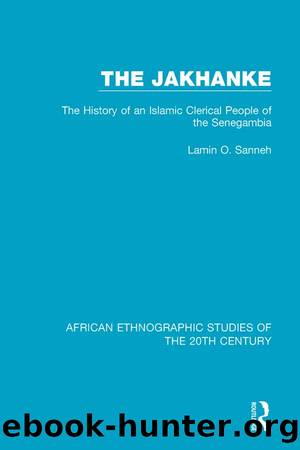The Jakhanke by Lamin O. Sanneh

Author:Lamin O. Sanneh [Sanneh, Lamin O.]
Language: eng
Format: epub
Tags: Religion, Islam, General, Reference, Social Science, Islamic Studies
ISBN: 9780819174819
Google: 0GGYQgAACAAJ
Publisher: University Press of America
Published: 1989-01-15T05:20:11+00:00
The Exile and Return of Karamokho Sankoung, 1911â17
Karamokho Sankoung did not in fact serve the full ten-year sentence in detention. He was to be released and placed under official surveillance at Dakar in April, 1916. Before his final release came, however, intense activity was needed to obtain a remission of sentence. On the official level, attempts were made to prove his political innocence. The Governor-General wrote to the Lieutenant-Governor of Guinea requesting a reconsideration of remission of sentence. He stated that during the eighteen months that Sankoung had lived in Dakar after his transfer from Mauritania there had been no cause for holding him to account, and that âhis culpability in the affair of the WalÄ« was very limitedâ35 The Head of the Political Affairs Department minuted in a Report to the Permanent Commission of the Council of Government that Shaykh Sidiya, a favourite ally of the French, had given a personal guarantee on the political intentions of Sankoung and of his loyalty. Shaykh Sidiya was commended in this report as a man âwhose devotion to the French cause and high moral worth are indisputable.â36 It appears that these official pronouncements achieved their objective and on 10th September, 1917, Sankoung was granted remission of sentence and allowed to return to Touba (Suret-Canale 1970: 77). He died there, according to different traditions, some eleven or twelve years later (1928/9).
The oral accounts give much more detail about Sankoungâs imprisonment and release, most of which represents the eye-witness account of Karamokho Sankoungâs eldest son, al-ḤÄjj Banfa Jabi, supplemented by his younger brother, al-ḤÄjj Soriba.37 According to this combined account, which follows in detail, Karamokho Sankoung was arrested at Touba and taken to Conakry. Then he was transported by sea to Gorée before being transferred to Port-Etienne in Mauritania. His prisoner-companions were Alfa Yahya, his son, Aguibou, and Ba Gassama. Alfa Yahya was to die at Port-Etienne. In about 1914, al-ḤÄjj Banfa left Touba on a mission to try to obtain his fatherâs release. He travelled to Boké before continuing to Dakar. From there he went to Boutilimit to see Shaykh Sidiya Baba and appealed to him to intercede with the French authorities on his fatherâs behalf. He then went to Port-Etienne to visit his father. The French authorities had informed Port-Etienne of his arrival in general terms (Suret-Canale 1970: 76). According to Banfa and Soriba, al-ḤÄjj Banfa spent two years with his father at Port-Etienne, during which time he was able to put fresh heart into the surviving prisoners. After this, he returned to Boutilimit to see Shaykh Sidiya once more. This time he left Boutilimit in Shaykh Sidiyaâs company, and headed for Dakar. In Dakar they approached a certain Capt Martin to help them obtain Sankoungâs release. At about the same time Banfa saw the Senegalese politician, Blaise Diagne, later a deputy in the French Assembly (cf. Johnson 1973). Blaise is reported to have promised help, but at a price: Banfa was to write to both Shaykh Sidiya and Sankoung to ask
Download
This site does not store any files on its server. We only index and link to content provided by other sites. Please contact the content providers to delete copyright contents if any and email us, we'll remove relevant links or contents immediately.
Phoenicians among Others: Why Migrants Mattered in the Ancient Mediterranean by Denise Demetriou(595)
american english file 1 student book 3rd edition by Unknown(590)
Verus Israel: Study of the Relations Between Christians and Jews in the Roman Empire, AD 135-425 by Marcel Simon(585)
Caesar Rules: The Emperor in the Changing Roman World (c. 50 BC â AD 565) by Olivier Hekster(569)
Basic japanese A grammar and workbook by Unknown(554)
Europe, Strategy and Armed Forces by Sven Biscop Jo Coelmont(512)
Give Me Liberty, Seventh Edition by Foner Eric & DuVal Kathleen & McGirr Lisa(491)
Banned in the U.S.A. : A Reference Guide to Book Censorship in Schools and Public Libraries by Herbert N. Foerstel(479)
The Roman World 44 BC-AD 180 by Martin Goodman(469)
Reading Colonial Japan by Mason Michele;Lee Helen;(462)
DS001-THE MAN OF BRONZE by J.R.A(458)
The Dangerous Life and Ideas of Diogenes the Cynic by Jean-Manuel Roubineau(451)
Introducing Christian Ethics by Samuel Wells and Ben Quash with Rebekah Eklund(446)
Imperial Rome AD 193 - 284 by Ando Clifford(445)
The Oxford History of World War II by Richard Overy(444)
Catiline by Henrik Ibsen--Delphi Classics (Illustrated) by Henrik Ibsen(416)
Literary Mathematics by Michael Gavin;(406)
Language Hacking Mandarin by Benny Lewis & Dr. Licheng Gu(400)
Brand by Henrik Ibsen--Delphi Classics (Illustrated) by Henrik Ibsen(377)
